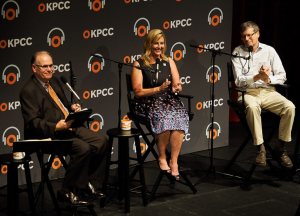Listen to the story on KPCC, by following this link.
Larry Mantle and industry experts and workers discussed the impact and implementation of a $15 minimum wage hike in the City of Los Angeles at the El Portal Theatre in North Hollywood on July 7, 2015.
KPCC’s AirTalk’s event focused on the impact and implementation of a wage hike. Industry leaders most affected by the pay boost discussed three key areas: impact on the restaurant industry; next steps for LA businesses, workers and government leaders; and how neighboring cities will respond to LA’s bold experiment.
Guests:
George Abou-Daoud, Restaurant Proprietor and Chef; Co-founder of The Neighborhood Restaurant Coalition of Los Angeles – representing over 1,000 independent LA restaurants
Kathy Hoang, Director, Restaurant Opportunities Center of Los Angeles
Michaela Mendelsohn, Owner of El Pollo Loco franchise locations with over 33 years of experience in the industry; transgender activist
THE RAISE THE WAGE CAMPAIGN WON AN HISTORIC VICTORY, WHAT’S NEXT?
In the aftermath of the City Council’s passage, national news called the wage hike a “bombshell” and some columnists characterized it as “an experiment” unleashed on one of the country’s largest cities. Mayor Eric Garcetti trumpeted the historic law for “enabling working families in LA to lift themselves out of poverty and tying our minimum wage to the cost of living to make this justice last. LA as a whole will benefit from this boost: we have always prospered the most when everyone is able to spend money into our economy.”
“Studies and economists have told the council that this will add 6 billion dollars per year to L.A.’s economy,” says LA City Councilmember Paul Krekorian.
In the meantime, business leaders complain mom & pop operations will go bankrupt.
“It’s too much too fast for the smaller businesses. We need a longer phase-in period,” says Nicole Shahenian of the Hollywood Chamber of Commerce. She adds, “The only restaurants that will be able to survive this are the Applebees of the world.”
Since the passage, companies and union leaders have sought to tailor its implementation, including a stymied first attempt to exclude workers who negotiate labor agreements, which some perceived as a strategy to drive more unionization in the city.
How are companies preparing for the hike? What effect will the wage hike have on the tumultuous housing market? What will be the long-term effect on the types of industries, and types of workers, that can thrive in Los Angeles?
Guests:
Paul Krekorian, City Councilmember for the 2nd district encompassing the San Fernando Valley
Nicole Shahenian, Vice President of Government Relations, Hollywood Chamber of Commerce
DOMINO EFFECT BEYOND THE CITY OF LA
Other cities in Southern California expected to adopt a higher wage soon are Santa Monica and West Hollywood. As well, LA County’s Board of Supervisors is debating a wage hike that would be imposed on companies based in unincorporated parts of the county. While the California Senate passed a bill proposing a statewide increase to $13 an hour, analysts say it faces an unlikely fate in the Assembly and with Governor Jerry Brown.
Places like Torrance, El Segundo, and Glendale have made no moves to raise their minimum wage.
Californians are dealing with a patchwork of policies that push and pull on workers and business owners.
“It will be a bit crazy because one side of the road to the other, there’s going to be different rules of the road,” said Tracy Rafter, CEO of the Los Angeles County Business Federation. “Many businesses operate in different cities, different jurisdictions. How they’re going to navigate managing that—recruiting, hiring, selling, and competing—is going to be tricky.”
UCLA labor expert Chris Tilly says studies show something different: “In most cases, the effects of raising the minimum wage in one county and not the surrounding ones are very small, not statistically significant, it nets to close to zero change in jobs.”
Some cities aim to lure LA businesses away from the new ordinance, while other cities worry their best workers will focus on LA jobs for the higher wage.
Guests:
Tracy Rafter, Founding CEO, Los Angeles County Business Federation, also known as BizFed
Chris Tilly, Director of UCLA’s Institute for Research on Labor and Employment
